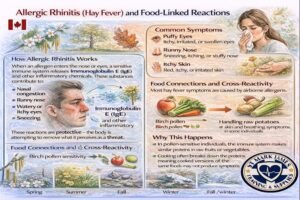Allergic Rhinitis (Hay Fever) and Food-Linked Reactions

How Allergic Rhinitis Works
When an allergen enters the nose or eyes, a sensitive immune system releases immunoglobulin E (IgE) and other inflammatory chemicals. These substances contribute to:
-
Nasal congestion
-
Runny nose
-
Watery or itchy eyes
-
Sneezing
-
Puffy or irritated skin around the eyes or face
These reactions are protective — the body is attempting to remove what it perceives as a threat.
Food Connections and Cross-Reactivity
Most hay fever symptoms are caused by airborne allergens, not food. However, some individuals experience oral or nasal allergy symptoms when handling or eating certain raw foods. This is due to cross-reactivity, where proteins in foods resemble proteins in pollens.
Examples include:
-
Birch pollen sensitivity → apple, carrot, celery
-
Handling raw potatoes → skin and breathing symptoms in some individuals
Symptoms can include itchiness, mild swelling, and congestion — similar to allergic rhinitis.
Why This Happens
In pollen-sensitive individuals, the immune system mistakes similar proteins in raw fruits or vegetables for pollen. This triggers IgE release and subsequent irritation. Cooking often breaks down the proteins, meaning cooked versions of the same foods may not produce symptoms.
Treatment and Management
Allergies cannot be cured, but symptoms can be managed through:
-
Antihistamines: block histamine-related inflammation
-
Nasal corticosteroids: reduce congestion and swelling
-
Decongestants: relieve nasal blockage (short-term use)
-
Avoidance of known triggers: especially during peak pollen seasons
Those who notice repeat reactions after handling or eating certain foods should report them to a healthcare provider for assessment.
Canadian Seasonal Considerations
In Canada, birch and grass pollens are common spring and summer triggers, while mould and indoor dust exposure can worsen symptoms in colder months. Cross-reactive food symptoms are more noticeable during peak pollen season when the immune system is already primed.
Allergies and Safety Context
Across schools, workplaces, and community programs, allergy awareness is an important component of first aid education. Severe food or environmental allergies may require emergency preparedness training such as:
-
Understanding when to seek emergency help
-
CPR/AED training for broader emergency readiness
These skills support safer environments for children, workers, and the public.
Disclaimer
This post is for public education only and not a substitute for medical assessment. Canadians who suspect allergies should seek guidance from a qualified healthcare provider for proper testing and management.
